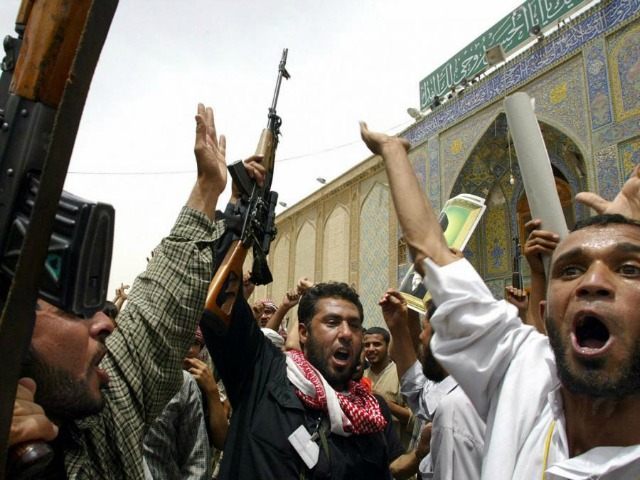Iraqi security forces and American officials are racing to find “several” Americans missing from Baghdad, according to the U.S. Embassy.
Most major media accounts describe three Americans and an Iraqi interpreter kidnapped in Baghdad by forces not yet identified, although the prevailing theory holds that the perpetrators were one of several Shiite militias operating in the area.
Details are hard to come by, ostensibly because Iraqi authorities do not want to hinder their own investigation by releasing too much information. AFP notes that the victims were kidnapped from what a security official described as a “suspicious apartment,” which is taken as a euphemism for a brothel.
According to an Iraqi intelligence official who spoke to the Associated Press, the Americans were invited to the apartment, taken prisoner, and transported to Sadr City, where “all communications and contact stopped.”
The AP report quotes a spokesman for the Joint Operations Command in Baghdad who said the victims are Iraqis with U.S. citizenship, who were working as contractors at Baghdad International Airport.
Speaking anonymously, an Iraqi police colonel said the kidnappers were “militiamen wearing military uniforms.” The incident is compared to the abduction of two dozen Qatari hunters last month–whose fate and the identity of their kidnappers are still unknown–and the kidnapping of 18 Turkish workers in Baghdad three months before that. A group that described itself as a Shiite militia claimed responsibility for the abduction of the Turks.
NBC News notes the two most powerful Shiite militias in Baghdad are Asaib Ahl al-Haq and the Hezbollah Brigades. There is also a third smaller militia called Saraya al-Salam, loyal to “Shiite firebrand leader Moqtada al-Sadr.” Asaib Ahl al-Haq was responsible for the abduction of an Iraqi-American from Baghdad in January 2010.
In December, as there was talk of a stronger American troop presence in the battle to recapture the city of Mosul from the Islamic State, Shiite militia groups vowed that they would stop fighting ISIS and turn on Americans if such troops were deployed. Secretary of Defense Ashton Carter announced last week that hundreds of additional U.S. special forces troops were “now in place” in Iraq.
The Associated Press observes that security in formerly “safe” areas of Baghdad has deteriorated as government forces have been shifted to the front lines to battle ISIS, and Shiite militias have stepped into the power vacuum created by the collapse of the Iraqi military.
Kidnappings by militia groups and criminal gangs have become more common in Baghdad over the past few months, as have terrorist attacks by ISIS militants, such as the bloody attack on a shopping mall in Baghdad last week that killed 18 people–conducted at the same time as bombings north of Baghdad that killed 20 more.
“We are working with the full co-operation of the Iraqi authorities to locate and recover the individuals,” the BBC quotes a State Department official.
“The safety and security of American citizens overseas is our highest priority,” added State Department spokesman John Kirby.

COMMENTS
Please let us know if you're having issues with commenting.